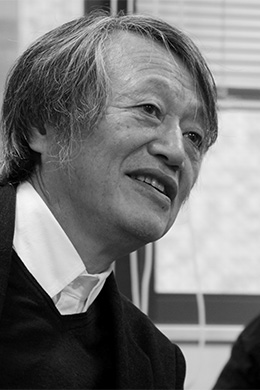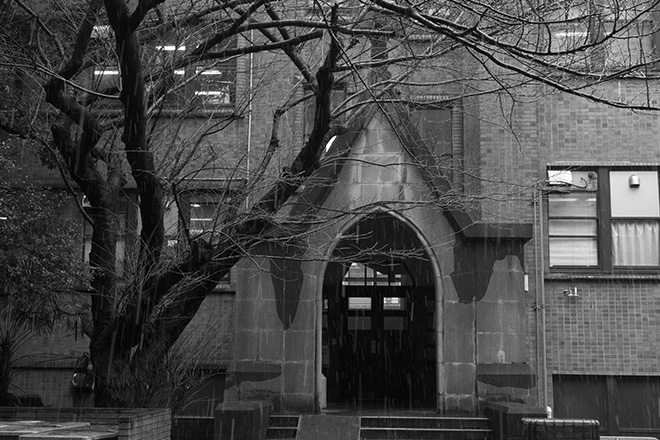Enjoying uncertain “knowledge”
Hisashi Kurokura / Professor, Graduate School of Agricultural and Life Sciences, The University of Tokyo
During such confrontations, it is truly within intellectual work that you have to think in what way your own inner world should be deployed.

——— Professor Kurokura, you began in technical research in aquaculture; now, you are widely active in oceanic policy and economic evaluation, psychological talks, and the like. Could you tell us about your background in research?
Kurokura: In graduate school, I focused my work on fish sperm preservation methods, and I performed technical research and delivered talks about the cells. If I went down this route, I would be doing things like handling cells the way they are.
The year I graduated from high school was the year of the University of Tokyo Dispute, when there weren’t any entrance exams. So, I entered the University of Tokyo the year after. Saying it like that, I think you understand a little of the atmosphere of those times, but there were incidents like those of the Coalition Red Army; when I came to the university it had hardly normalized, there were almost no classes, and I didn’t really study.
During all this, many people lived their lives in many different ways.
At the time, groups creating companies similar to development consultancies, made up of people who ran away from graduate school, were bubbling up around Japan.
I had joined one of these groups. The salary was not very good, but I guessed that the time would come and decided to give it a go. At that time, Japan’s fisheries technologies were reasonably useful and had an up-to-date feel.
Because my research was rooted in practicality, I could consult in the form of technology transfer.
In the end, what consultants or engineers should do is to gather variety of information and create a solution by any means, it is the job you have to do as an engineer, and you come to notice what they will pay you money for.
Until then, I had only known science. However, much time or money you spent was fine at university as you were investigating the truth, but the reality of industry is that you bear in mind that this style isn’t possible.
After this, I quit the company and returned to working as a university researcher. However, when I returned to the world of science where I had originally been, I realized that I already had this in something called engineering.
Because of this, someone asked me whether I would like to participate in the creation of a major called Global Agricultural Science, where students are taught from the beginning across a broad range of problem-oriented material. Most likely, the people who called me knew that I had this type of experience.
So, I did not think it is necessarily the question of whether it is good or bad to teach a broad range of material from the start or in a solution-oriented manner. I just feel that it would be better to have more people who know these types of things. That is the greatest reason why I do this now.

——— We hear that current students are busy, and postgraduate students say that they don’t have the time or space to think about things like that. In reality, do you have this kind of image?
Kurokura: How should I put it… I have no reason to say things like current students are lacking in their ability, or areas of interest that current students have is wrong. It’s just that when you run short distances and run long distances, the abilities that you will need are different, as are the running methods.
So, I definitely think that if current students are asked to solve problems at a starting signal, they work it out fast. The ways to solve problems are exactly arranged and remembered, because they have gone through a certain level of competition.
I do get the feeling that the way we solved math at high school is different from the way they do it now. I think we were solving it in a more clumsy manner. So there were many times we made mistakes, or couldn’t reach the goal. It’s just that, although there were problems that we couldn’t solve, you could say we got caught up in them as long as we couldn’t work them out. In other words, something like our thinking stamina was different, being able to think about something you don’t understand for as many hours as possible.
In short, people of the past think endlessly for a long time about things that do not matter much.

——— Professor Kurokura, you’ve been involved in a variety of efforts related to disaster revival, and last year you held the GSDM summer seminar in Tohoku.
Kurokura: Yes, that’s correct. We held the summer seminar in Tohoku. We feel bad for the people in the disaster-stricken area in saying this, but it is not a bad material to consider for specific thinking. Although it is in the form of a seminar, which is more like an event, the theme of revival required a major effort of in-depth thought. The seminar was premised on those types of serious themes.
In such situations, if you are the only Japanese person in a group of four people, you tend to sense that the group won’t be able to move forward unless you personally fulfill a certain role, be it the task that involves interviews or that in which you will have to make certain requests to the other people in the group. This feeling of making some sort of contribution has absolutely nothing to do with your English skills, whether you have an excellent command over English or you can’t speak English fluently. When you’re placed in that type of situation, for a week or some other duration of time, it becomes a valuable training.
This is true for almost every Japanese person; moreover, not all of the students who participated had good English skills. Even so, when it came right down to English skills, it didn’t really matter if they could or couldn’t speak English very well. At any rate, you are the only person who can communicate and obtain first-hand information in this type of situation; therefore, even if your English is poor, you just have to somehow convey the information you obtained to the other members in the group.
Even though barriers existed in terms of [the Japanese people] communicating in English, we anticipated that when the participants recognized the need for them to communicate information, they would somehow convey it.

——— Did you actually see the effect that you anticipated?
Kurokura: Yes, I think there was actually such an effect.
——— What do you expect from current students and is there any experience that you would like them to have?
Kurokura:For some reason, young people in the past may have been a bit reckless from a certain perspective, and they didn’t really give much thought to the future. There is something I always oppose to; when professors try to teach something to students, whether be it in the form of an experiment or research, they tell them that science is to form a hypothesis and try to hypothetically verify that hypothesis. However, this is probably the least interesting part of science. I think this is neither interesting nor fun, I feel there are other areas that are more interesting in the fields of science and biology, such as discoveries. I think that the true attraction of science is to be excited about such discoveries, and that being devoted to such aspects is one way of living. Basically, when you picture something in your mind, there is a pre-established story, and all you need to do is to verify that story is a truly watered-down view of science.
I like endurance swimming, because I like the feeling of drifting without any security. I find it interesting to control something that is unsteady, such as my body in that type of situation. Put simply, I think that the sensation of confronting the world in this manner fundamentally constitutes intellect. In other words, the idea that reading everything and then acting in a manner that is in alignment with what you read only demonstrates a very small portion of human intellect. Intellect is a feeling that there is a mysterious chaos like darkness on the other side that you are confronting. I believe that it is an intellectual task to consider how to best rouse your own inner world against such an entity.
In the end, I think intellect is something that is drifting and wandering without any certainty.
If there is something I need say to young people, it would be that we have been living in what was previously a very deterministic world, and we were raised to believe that living in that manner is an expression of intellect. Therefore, in a certain sense, we lack resiliency beyond this. However, I’ve been blessed to have contact with society, so I’ve intuitively realized that there are problems that cannot be solved only on the basis of the patterns adopted in this deterministic world. Therefore, if they are to focus on this as an area of study, I think today’s youth can value that type of feeling, and develop new methodologies and new fields. Perhaps this wouldn’t fit into the areas of economics or ecological science, and maybe, it also involves areas like physiology. Therefore, it is my opinion that something rather mysterious that we don’t view as science is going to come out of such endeavors.

